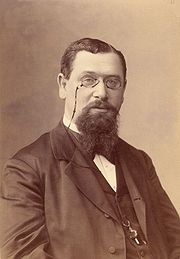
Max Wolff (physician)
Encyclopedia

Potsdam
Potsdam is the capital city of the German federal state of Brandenburg and part of the Berlin/Brandenburg Metropolitan Region. It is situated on the River Havel, southwest of Berlin city centre....
.
He studied medicine in Berlin
Berlin
Berlin is the capital city of Germany and is one of the 16 states of Germany. With a population of 3.45 million people, Berlin is Germany's largest city. It is the second most populous city proper and the seventh most populous urban area in the European Union...
, where he was a student of Rudolf Virchow
Rudolf Virchow
Rudolph Carl Virchow was a German doctor, anthropologist, pathologist, prehistorian, biologist and politician, known for his advancement of public health...
. Following graduation in 1866, he became an assistant at the clinic of internal medicine
Internal medicine
Internal medicine is the medical specialty dealing with the prevention, diagnosis, and treatment of adult diseases. Physicians specializing in internal medicine are called internists. They are especially skilled in the management of patients who have undifferentiated or multi-system disease processes...
at Rostock
University of Rostock
The University of Rostock is the university of the city Rostock, in the German state of Mecklenburg-Vorpommern.Founded in 1419, it is the oldest and largest university in continental northern Europe and the Baltic Sea area...
. From 1875 to 1882 he worked at the University of Berlin policlinic, and in 1900 became head of the policlinic for lung diseases. In 1890 he earned the title of associate professor in Berlin.
Wolff is remembered for his work with surgeon
Surgeon
In medicine, a surgeon is a specialist in surgery. Surgery is a broad category of invasive medical treatment that involves the cutting of a body, whether human or animal, for a specific reason such as the removal of diseased tissue or to repair a tear or breakage...
James Adolf Israel (1848-1926) involving the isolation of Actinomyces
Actinomyces
Actinomyces from Greek "actino" that means mucus and fungus, is a genus of the actinobacteria class of bacteria. They are all Gram-positive and are characterized by contiguous spread, suppurative and granulomatous inflammation, and formation of multiple abscesses and sinus tracts that may...
and research concerning the etiology of actinomycosis
Actinomycosis
Actinomycosis is an infectious bacterial disease caused by Actinomyces species such as Actinomyces israelii or A. gerencseriae. It can also be caused by Propionibacterium propionicus, and the condition is likely to be polymicrobial aerobic anaerobic infection.Actinomycosis occurs rarely in humans...
.
Selected publications
- Über Addison'sche Krankheit (Concerning Addison's DiseaseAddison's diseaseAddison’s disease is a rare, chronic endocrine disorder in which the adrenal glands do not produce sufficient steroid hormones...
), (1869) - Operative Behandlung von Unterleibsechinococcen (Operative treatment of Abdomen EchinococcusEchinococcusThe genus Echinococcus includes six species of cyclophyllid tapeworms to date, of the family Taeniidae. Infection with Echinococcus results in hydatid disease, also known as echinococcosis....
), (1870) - Über entzündliche Veränderungen innerer Organe nach experimentell bei Thieren erzeugten käsigen Herden (Concerning Inflammatory Changes of Inner Organs Following the Experimental Induction of Caseating Granulomas in Animals, Virchow's Archiv, LXVII)
- Zur Bacterienfrage bei accidentellen Wundkrankheiten (Concerning the Spread of BacteriaBacteriaBacteria are a large domain of prokaryotic microorganisms. Typically a few micrometres in length, bacteria have a wide range of shapes, ranging from spheres to rods and spirals...
in Accidental Wounds) (Virchow's Archiv LXXXI) - Eine weitverbreitete thierische Mykose (A Widespread Animal MycosisMycosisA mycosis is a fungal infection of animals, including humans. Mycoses are common, and a variety of environmental and physiological conditions can contribute to the development of fungal diseases...
), (Virchow's Archiv LXXXII) - Über Desinfection durch Temperaturerhöhung (About Disinfection during Temperature Increase) (Virchow's Archiv CII)
- Die Localisation des Giftes in den Miesmuscheln (Localization of Poison in Mussels), (Virchow's Archiv CIII)
- Die Ausdehnung des Gebietes der giftigen Miesmuscheln und der sonstigen giftigen Seethiere in Wilhelmshaven (Extension of the Territory of Toxic Mussels and other Toxic Sea Creatures in WilhelmshavenWilhelmshavenWilhelmshaven is a coastal town in Lower Saxony, Germany. It is situated on the western side of the Jade Bight, a bay of the North Sea.-History:...
), (Virchow's Archiv CIV) - Über das erneute Vorkommen von giftigen Miesmuscheln in Wilhelmshaven (Concerning the Re-occurrence of Toxic Mussels in Wilhelmshaven), (Virchow's Archiv CX)
- Über Vererbung von Infectionskrankheiten (Inheritance of Infectious DiseaseInfectious diseaseInfectious diseases, also known as communicable diseases, contagious diseases or transmissible diseases comprise clinically evident illness resulting from the infection, presence and growth of pathogenic biological agents in an individual host organism...
s), (Virchow's Archiv CXII) - Über Vaccination neugeborener Kinder (Vaccination of Newborn Children), (Virchow's Archiv CXVII)
- Über Reincultur des Actinomyces und seine Übertragbarkeit auf Thiere (About Pure Culture of ActinomycesActinomycesActinomyces from Greek "actino" that means mucus and fungus, is a genus of the actinobacteria class of bacteria. They are all Gram-positive and are characterized by contiguous spread, suppurative and granulomatous inflammation, and formation of multiple abscesses and sinus tracts that may...
and its Transferability to Animals), Virchow's Archiv CXXVI) - Zur Actinomyces-Frage (On the Question of Actinomyces, Virchow's Archiv CLI)
- Zur Prophylaxe der venerischen Krankheiten (Regarding Prophylaxis of Venereal Disease), 1893
- Die Nierenresection und ihre Folgen (Of KidneyKidneyThe kidneys, organs with several functions, serve essential regulatory roles in most animals, including vertebrates and some invertebrates. They are essential in the urinary system and also serve homeostatic functions such as the regulation of electrolytes, maintenance of acid–base balance, and...
Resection and its Consequences), 1900

